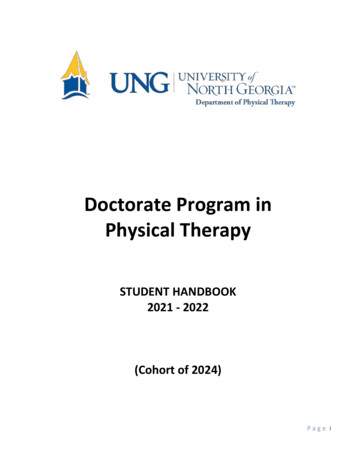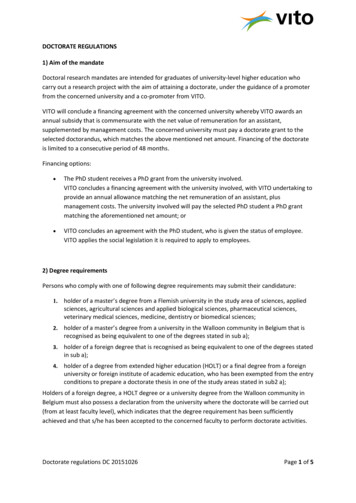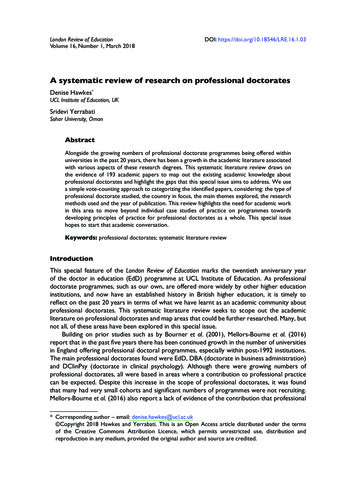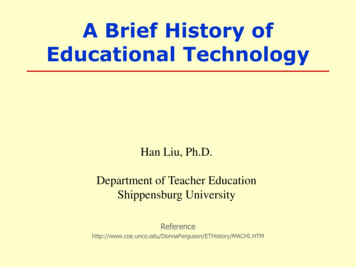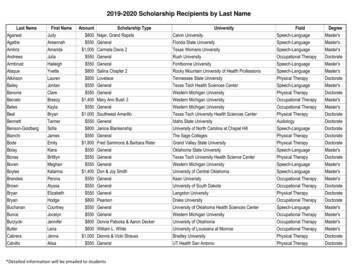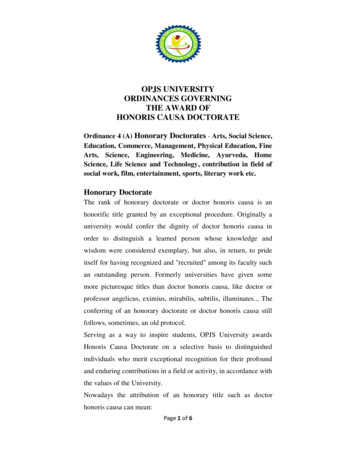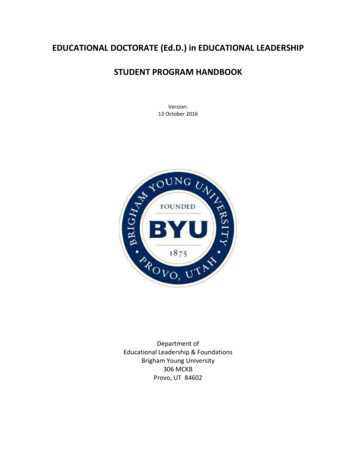
Transcription
EDUCATIONAL DOCTORATE (Ed.D.) in EDUCATIONAL LEADERSHIPSTUDENT PROGRAM HANDBOOKVersion:13 October 2016Department ofEducational Leadership & FoundationsBrigham Young University306 MCKBProvo, UT 84602
The Educational Doctorate (Ed.D.) in Educational LeadershipDEPARTMENT OF EDUCATIONAL LEADERSHIP AND FOUNDATIONSDear Students,Welcome to the Ed.D. program at the McKay School of BYU. This revised Ed.D. program isbased on a scholar‐practitioner model and sets ambitious learning outcomes for thestudents. You have been selected from a large candidate pool to be in this cohort, andwe are confident that together we can achieve these outcomes.This student handbook is meant to help you understand program policies and processes.Please don’t be put off by its legal tone—it is almost impossible to adopt any other tonewhen writing general policies and processes. Know that we are eager to work with you incourses and in your research to enhance your leadership skills in order to improve theeducational institutions with which you are affiliated. Your success is our success.Together we can continue to build an Ed.D. program with a reputation of high quality andimprove the educational experiences of students at all levels.Warmest regards,Pamela Hallam, ChairDepartment of Educational Leadership & Foundationsii
The Educational Doctorate (Ed.D.) in Educational LeadershipTABLE OF CONTENTSAbout This Handbook . vDoctoral Program Committee. vThe Educational Doctorate (Ed.D.) in Educational Leadership . 1EDLF Vision . 1EDLF Mission . 1Carnegie Project on the Education (CPED) Doctorate . 2Ed.D. Program Overview . 3Being—Knowing—Doing . 3Program Learning Outcomes & Curricular Foundation . 4Ed.D. Program Processes . 5Admissions . 5Financial Aid Opportunities . 5Dissertation Committee . 6Program of Study . 6Progress Toward Graduation . 7Minimum Registration . 7Course Evaluations . 7Attendance and Adequate Performance . 8Course Performance Expectation . 8Graduate Student Evaluation. 8Program Components . 10Required Academic Courses, Sequence & Schedule . 10Comprehensive Exam . 11Prospectus Worksheet and Defense. 12IRB Application and Approval . 14Dissertation and Defense Processes . 16Graduation . 25Application for Graduation . 25Graduation & Convocation Ceremonies . 26iii
The Educational Doctorate (Ed.D.) in Educational LeadershipPetition to Walk . 26Core BYU Policies . 27BYU Honor Code . 27Preventing Sexual Harassment . 27Students with Disabilities. 27Discrimination . 27Plagiarism . 28Resources . 29Computer and Network Access . 29Student Feedback . 29Doctoral Student Input . 29Grievances. 29Appendix A: EDLF Faculty. 29Appendix B: Memorandum of Understanding . 32Appendix C: EDLF Prospectus Forms . 35Appendix D: EDLF Dissertation Template . 48Appendix E: Dissertation Defense Scheduling & Approval Form (DDSA) . 77Appendix F: Ed.D. Program Co‐Authorship Agreement Form . 80Appendix G: MSE Dean’s Office Checklist & Instructions for Dissertation Format . 85Appendix H: Summary of Dissertation Review & Approval Processes . 98Appendix I: Dissertation & Graduation Deadlines . 101iv
The Educational Doctorate (Ed.D.) in Educational LeadershipAbout This HandbookThis handbook details the policies procedures, resources, and expectations for students in theEd.D. program offered through the Department of Educational Leadership & FoundationsDepartment1 (EDLF) in the David O. McKay School of Education (MSE). This version of thehandbook supersedes and replaces all previous versions, memos, and updates. A currentversion of the handbook is available through the departmental web site. Its information issubject to correction or change by the EDLF department at any time. The department willattempt to notify current students by e‐mail or memo of any handbook changes. However,students are responsible for meeting the policies and requirements of the most recenthandbook version applying to their cohort. The contact person for this handbook is Professor E.Vance Randall (vance randall@byu.edu).Doctoral Program CommitteeThe Ed.D. Program is supervised by the Doctoral Program Committee that is responsible foroverseeing and implementing the policies and academic programming of the Ed.D. Program, asestablished by the committee of the whole (COW) of the EDLF department. One member servesas Chair of the committee. Following are the members of the doctoral committee:Chair:E. Vance Randall, Ph.D., ProfessorMembers:Steven J. Hite, Ed.D., ProfessorSterling Hilton, Ph.D., Associate ProfessorDon Baum, Ph.D., Assistant ProfessorBryan Bowles, Ed.D., Assistant Professor1Short bios of all Graduate Faculty Status faculty members in the Department of EducationalLeadership & Foundations can be found in Appendix A.v
The Educational Doctorate (Ed.D.) in Educational LeadershipThe Educational Doctorate (Ed.D.) in Educational LeadershipThe Ed.D. Program is offered through the Department of Educational Leadership and Foundations(EDLF) in the David O. McKay School of Education at Brigham Young University. This doctoraldegree program is grounded in the Mission of Brigham Young University “to assist individuals intheir quest for perfection and eternal life. That assistance should provide a period of intensivelearning in a stimulating setting where a commitment to excellence and the full realization ofhuman potential is pursued.” In addition, the Mission of the McKay School of Education is that“We strive to model the attributes of Jesus Christ, the Master Teacher, as we prepareprofessionals who educate with eternal perspective.” Inherent in these Missions is a Christianworldview, a belief in the eternal nature of man, a commitment to the theological imperative ofgaining all the knowledge we can, and the doctrinal teaching that “the glory of God is intelligence,or, in other words, light and truth” (Doctrine & Covenants 93:35).Nested within the BYU and McKay School of Education Mission is the Vision and Mission of theDepartment of Educational Leadership and Foundations.EDLF VisionOur vision is to improve life conditions and opportunities for individuals, families andcommunities worldwide.EDLF MissionAs educational leaders, our mission is to improve the equity and quality of teaching and learningenvironments throughout the world. We accomplish this mission through the integration ofresearch, teaching, and service to strengthen educational opportunities for all people worldwide.This integrated mission is accomplished by realizing the following three aims: Explore and expand the knowledge of educational leadership in theory, policy, andpractice to provide conceptual and practical foundations. Foster the growth of educational leaders of faith and character who possess therequisite knowledge, skills, and dispositions to fulfill our mission. Build the capacity of individuals, families, communities, states and nations to identifyand solve educational problems.1
The Educational Doctorate (Ed.D.) in Educational LeadershipCarnegie Project on the Education (CPED) DoctorateThe EDLF Department is proud to be a consortium member of the CarnegieProject on the Education Doctorate (CPED). CPED is a Consortium of over 80colleges and schools of education, which have committed resources to worktogether to undertake a critical examination of the doctorate in education(Ed.D.) through dialog, experimentation, critical feedback and evaluation.CPED vision. As explained on their website, the vision of the CPED is to transform theEd.D. (referred to as a Professional Practice Doctorate within the Consortium) into the degree ofchoice for preparing the next generation of practitioner experts and school (K‐12) college leadersin Education, especially those who will generate new knowledge and scholarship abouteducational practice (or related policies) and will have responsibility for stewarding the Educationprofession.CPED mission. To accomplish this vision, the mission of CPED is to improve the efficacyand reliability of the professional doctorate in education for the advanced preparation of schoolpractitioners and clinical faculty, academic leaders and professional staff for the nation’s schools,colleges and the learning organizations that support them. This mission is done by redesigning allaspects of Ed.D. programs including: curriculum, assessments, admissions, etc.To this end, CPED does not offer a prescription for professional practice preparation programs,but rather honors the local context of the school of education as well as those constituents whoare served by its member programs. As a result, CPED created the following principles andarchitecture to inform professional practice preparation program development.We, the members of CPED, believe:The professional doctorate in education prepares educators for the application ofappropriate and specific practices, the generation of new knowledge, and for thestewardship of the profession.CPED principles. With this understanding, CPED identified the following statements thatwill focus a research and development agenda to test, refine, and validate principles for theprofessional doctorate in education. The CPED Professional Doctorate in Education: Is framed around questions of equity, ethics, and social justice to bring about solutionsto complex problems of practice. Prepares leaders who can construct and apply knowledge to make a positive differencein the lives of individuals, families, organizations, and communities. Provides opportunities for candidates to develop and demonstrate collaboration andcommunication skills to work with diverse communities and to build partnerships. Provides field‐based opportunities to analyze problems of practice and use multipleframes to develop meaningful solutions. Is grounded in and develops a professional knowledge base that integrates bothpractical and research knowledge, that links theory with systemic and systematicinquiry. Emphasizes the generation, transformation, and use of professional knowledge.2
The Educational Doctorate (Ed.D.) in Educational LeadershipEd.D. Program OverviewThe Ed.D. Program will follow the cohort delivery method, which results in a very specific andconcentrated field of inquiry. Requirements include satisfactory completion of courseworkconsisting of: (a) 88 credit hours distributed as up to 36 hours of credit for completion of anappropriate master’s or comparable degree, (b) 40 hours of core disciplinary subject mattercoursework, and (c) 12 hours of dissertation credit.Students will be required to pass a faculty evaluation at the end of each semester to continue theprogram into the second and third years. Students will be required to complete a comprehensiveexam and successfully complete a dissertation. Students should be able to complete the programin three to four years.The Ed.D. Program requirements are intended to avoid competition with or duplication ofexisting PhD programs in the School of Education; the program has been designed to utilize allthe unique strengths of an Ed.D. model as studied and developed by nationally ranked peers inthe Carnegie Project on the Education Doctorate. Details concerning the admissions process,prerequisites, proposed curricula, and schedules follow.Being—Knowing—DoingEducation is inherently value‐laden. Likewise, leadership is a moral endeavor with its own sets ofvalues and beliefs. Leaders are not just to lead but also to engage in the essential transformationof themselves, other individuals, organizations and society “towards the full realization of humanpotential” and a society where all are “of one heart and one mind and there [are] no pooramong them” (Moses 7:18). All are alike unto God, and as God’s children, we are all brothers andsisters. This transformational process of personal growth in goodness must begin first with theleader. Leadership is first and foremost a personal and individual characteristic, a combination ofthe matters of the heart and the analytic skills of the mind. People cannot be effective leaders oforganizations until they know who they are as leaders, possessing their own personal worldview,vision and ethics to inform their thinking and to guide their actions. Authentic being mustconnect with learning and then doing if the action is to be good. You cannot be a good leaderunless you are a person who has a clear sense of self, possesses a moral compass, feels thedriving force of a personal mission, and has a compassionate regard for others.The Ed.D. Program integrates leadership with stewardship. This complementary integrationstrives to produce steward leaders. A steward leader is motivated by the following beliefs: Man is God's steward who, along with others, gives him or her a stewardship or aresponsibility to serve and uplift others. In serving others, we are also serving God. We are accountable to God and others for our stewardship. As the Lord’s servants, we are moral agents charged with the care, nurturing,development and growth of others. Stewardship consists of how we use our time, talents, and resources to build othersand contribute to a more just society.3
The Educational Doctorate (Ed.D.) in Educational LeadershipProgram Learning Outcomes & Curricular FoundationThe EDLF Ed.D. Program in Educational Leadership prepares mid‐career leaders for advancedleadership positions in educational institutions. Graduates will exhibit the dispositions,knowledge, and skills to make educational organizations transformational places for preparing allstudents, regardless of background or individual circumstances, for a productive and fulfilling lifeand to contribute to the improvement of our society. The goal of the program is to equip ethicalleaders to use research and best practices to improve learning, personal and societal well‐being,and other important outcomes in educational settings “where a commitment to excellence andthe full realization of human potential is pursued” (BYU Mission Statement) for all students.Graduates of this program will be able to: Understand and develop into steward leaders in education who are moral changeagents committed to assist in the profound and broad transformation of individuals,educational organizations and society. Understand and influence the larger educational ecosystem with its political,philosophical, social, economic, legal, and cultural contexts to expedite thetransformation of education organizations. Possess the knowledge, skills, and strategies to facilitate organizational and systemicchange in education towards an equitable, excellent and transformative learningenvironment for all students. Apply the knowledge, skills, and inquiry strategies acquired in this program to solvesignificant problems of educational practice.These program‐learning outcomes can be organized into four operational domains with sub‐components, which lay a curricular and course foundation for the Ed.D. Program (see Table 1).Table 1Four Ed.D. Operational DomainsPersonal andInterpersonal DomainContextual DomainOrganizational DomainInquiry Domain Worldviews and EthicsSteward Leaders and Leadership TheoryInterpersonal Relationships, Communication, and Group DynamicsTeaching and LearningPhilosophy of EducationPolitical Ideology and Governance in EducationSocial and Cultural Foundations of EducationLegal AspectsOrganizational Change and DevelopmentStrategic Leadership and PlanningStrategic Use of Human and Fiscal ResourcesEducation Policy and PoliticsProblem Identification and ResolutionResearch Methodology and Methods (Quantitative and Qualitative)Analytics (Statistics and Data Analysis)Personnel and Program Evaluation4
The Educational Doctorate (Ed.D.) in Educational LeadershipEd.D. Program ProcessesAdmissionsThe deadline for program admissions is March 1st during even years only. To be admissible to theEd.D. Program, an applicant is required to have a master’s degree (or acceptable equivalent). Tobe competitive for admission, applicants need to meet the following qualifications:1. Three years of leadership experience in an educational setting before beginning theprogram.2. A cumulative GPA of at least 3.0 (on a 4.0 scale) during the last 60 hours of coursework.3. One of the following three graduate admissions tests, at following level of performance:a. GRE, with each sub‐test score at or above the 50th percentile;b. LSAT, with a test score at or above the 60th percentile; and/orc. GMAT, with a test score at or above the 50th percentile.4. A clear statement in the letter of intent that describes how the Ed.D. will facilitateadvancement in the applicant’s current career trajectory.Students may also be asked to participate in interviews with faculty by telephone, videoconferencing or in person as part of the admissions process.A completed BYU Graduate School application must be received (Online Application). Thecompleted application form must include: a report of scores obtained on the Graduate RecordExamination (GRE), LSAT, or GMAT; official transcripts of all previous college and universitystudies; a letter of intent addressed to the admissions committee; letters of recommendationfrom three individuals who are familiar with the student’s work such as his or her currentsupervisor and scholarly potential; and a completed Ecclesiastical Endorsement form.Admission decisions should be made by late March. Upon notification of an offer of admission tothe program, students must submit within two weeks a completed Memorandum ofUnderstanding (see Appendix B) from their employing institution or direct supervisor detailingthe time commitment and travel requirements of the program and agreeing to support thestudent’s admission into the program. Students will not be allowed to enroll in classes for thefirst summer of study until this memo is placed in their file. This requirement is not negotiable.Financial Aid OpportunitiesThe EDLF Department has very limited funding for its students and our annual scholarshipfunding is variable from year to year. Incoming students interested in financial aid should submitthe EDLF Ed.D. Program Application for Financial Aid form as part of the initial applicationprocess for funding in the summer or fall of the current calendar year. This form can be found onthe website or obtained from the Department Secretary in 306 MCKB and is due by July 15th.The Ed.D. Program Committee will review applications and determine the scholarship funding.Students should be aware that receiving funding for one year does not guarantee that a studentwill receive the funding the next year.5
The Educational Doctorate (Ed.D.) in Educational LeadershipDissertation CommitteeThroughout the course of the Ed.D. Program, each student will work under the supervision of adissertation committee. Dissertation committees are comprised of five members, all of whommust hold graduate faculty status at BYU. One member of the dissertation committee serves aschair who will chair the student’s dissertation, and the other four members serve either as major(2) or minor (2) committee members. The dissertation chair, major committee members and atleast one minor committee member must be a member of the EDLF faculty. The dissertationcommittee also function as the examining committee for the prospectus and dissertationdefenses. If a student has constituted a dissertation committee in collaboration with the chair,then this committee will likely be the committee throughout the entire program of study. If thecommittee is not formed in collaboration with the chair, then a temporary committee will beconstituted by the department, which committee will need to be replaced at the earliest possibleopportunity with faculty members who have been specifically recruited to work with the studentand chair on a specific topic. Students with similar research problems may choose to worktogether with one or more faculty member(s), or a student can choose to work with oneprofessor and the committee in the more traditional committee structure.The responsibilities of the chair, as well as major and minor members, are specified in theDissertation and Defense Processes section of this handbook.Program of StudyThe Study List is a form used to designate for the student the program of study or which coursesneed to be taken to complete the Ed.D. degree. This form is essentially a contract with theuniversity that the Ed.D. degree will be granted upon completion of the dissertation, thecomprehensive exam and the courses listed on the form (including 799R, Dissertation).The Ed.D. candidate’s dissertation chair will help with filling out the form, which is then signed bythe dissertation committee and sent to the EDLF graduate coordinator. The completed andsigned Study List form should be given to the department secretary by the EDLF graduatecoordinator no later than the end of the first summer term of graduate study. In accordance withuniversity policy, the department can place a hold on a graduate student for failure to submit aStudy List in a timely manner, which will block registration.With dissertation committee consent, students can make changes in the Study List, includingchanges in dissertation committee membership. All Study List changes must be submitted usingthe Study List Change form obtained from the department secretary. Signatures must beobtained on this form from the student’s dissertation chair, Graduate Coordinator and theDepartment Chair before the change is approved.A committee member cannot be removed from the committee without their prior knowledgeand consent, nor should they be removed from the committee to expedite the defense of theprospectus or dissertation. Prior to being asked to shift to or from, vacate, or accept a positionon a dissertation committee, at any point during the dissertation process, a faculty member mustbe informed in person by the dissertation chair of the rationale for the requested action. If the6
The Educational Doctorate (Ed.D.) in Educational Leadershipfaculty member concurs with the reason and rationale, then they can sign the appropriatelocation in the Study List Change form. If the faculty member does not agree with the rationale,particularly in the case of vacating a position on the dissertation committee, then the chair of thedissertation committee can present a petition in writing to the EDLF Committee of the Whole(COW) to authorize the removal of the faculty member from the committee. The decision of theEDLF COW regarding the petition is binding and final.Progress Toward GraduationStudents must make satisfactory progress2 in each of the semesters and terms during the Ed.D.program. While the university allows a maximum of eight years to complete the doctoral degree,this program is designed to be completed in three to four years. While this timeframe is possible,the student is responsible to make this timeframe a reality. In this program, only trulyexceptional reasons for extending beyond the university‐allocated eight years will be considered.Formal application for extension, including a careful presentation of the extenuatingcircumstances, proposed timeline (including the mechanisms for completion of all programrequirements), and plans to ensure program currency, must be made by the student to thedissertation committee. Upon signed and unanimous approval of the dissertation committee, theapplication will be forwarded to the graduate coordinator.Minimum RegistrationStudents must maintain minimum registration at the university to retain current student status. Ifthe minimum registration requirement is not met, the University automatically drops thestudent. Minimum registration is 6 credit hours per academic year (September through August).Additionally, the student must do the following: (a) register for and complete at least 2 credithours their first semester of graduate study, and (b) be registered for at least two hours duringthe semester of both the prospectus and dissertation defenses and graduation. Spring andSummer terms are counted together as being a single semester for these registrationrequirements. Students must be registered for at least one credit of dissertation at any time theyare working on their dissertation, including, but not limited to, writing, data collection andanalysis, and consulting with faculty.In addition, a student must be registered for at least 2 semester hours when employed oncampus (which includes graduate assistantships). Spring and Summer terms are countedseparately for this requirement.Course EvaluationsEach semester/term all students are strongly encouraged to complete course evaluations. Theseevaluations rate the course as well as the instructor. We ask all students to please take the timeat the end of each semester/term to complete these course evaluations. They can be found onMyBYU under Student Ratings. Student responses are anonymous (unless the student indicates2For definition and elaboration of satisfactory progress, please refer to the section on Graduate Student Evaluation.7
The Educational Doctorate (Ed.D.) in Educationa
The Educational Doctorate (Ed.D.) in Educational Leadership 2 Carnegie Project on the Education (CPED) Doctorate The EDLF Department is proud to be a consortium member of the Carnegie Project on the Education Doctorate (CPED). CPED is a Consortium of over 80
